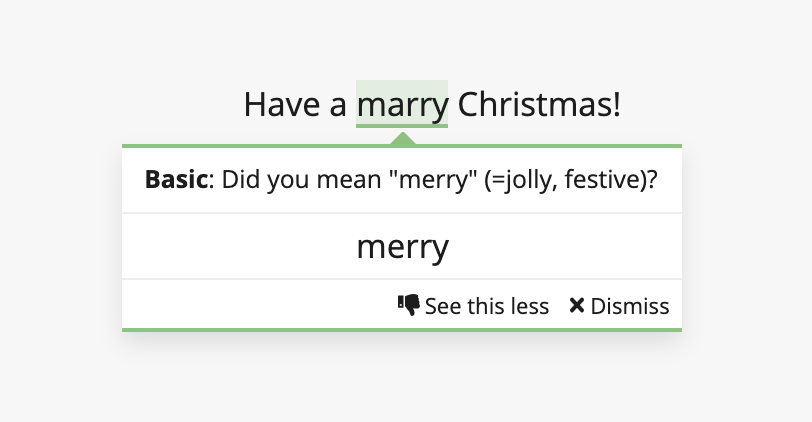'Tis the season to check your spelling
Make sure your season's greetings are grammatically correct with this handy guide.

The most wonderful time of the year is here. For many people, that means a month full of food, family, presents, and parties. But it's also a prime time for something else: grammar mistakes. From Christmas cards to festive Facebook posts, the opportunities to make an embarrassing typo are endless.
Sure, a minor spelling error may not seem like a big deal. But if you're writing for work, failing to proofread can have major consequences. For example, a supermarket chain in Australia had to recall a range of products last year after they were mistakenly labeled with "Merry Christhmas".
So if you're spreading season's greetings over the next few weeks, make sure to read this guide first.
1. Check your apostrophes
Apostrophes have two main uses: to show possession, and to form contractions. It's important to know how to apply them correctly in each situation, as a missing or incorrect apostrophe can change the meaning of your sentence.
Possession
If you want to show that something belongs to something else, an apostrophe will come in handy. Where it's placed will depend on a few factors, like whether the word is a singular or plural noun, whether it ends in the letter "s" or not, and what style guide you're using. For example:
- New Year's Day
- Season's Greetings
- Santa Claus' or Santa Claus's (depending on style guide)
However, some people get possessive apostrophes confused when it comes to names and plurals. If you wanted to say "Merry Christmas from the Gomezes", for example, you don't need an apostrophe for "Gomezes".
Contractions
Contractions are shortened versions of a word or multiple combined words. Whenever you write one, the apostrophe is placed where the missing letter or letters would normally be. For example, "'Tis the season" is the shortened version of "it is the season".
Contractions are an effective way to make your writing more concise. You'll notice that we've used several of them in this article! However, avoid using too many contractions if you're writing something formal, like an essay or report.
2. Capitalize the right words
Different style guides have varying rules about what should and shouldn't be capitalized. But as a general rule, you should always capitalize the first word and any proper nouns in a sentence. Proper nouns are the names of specific things, like people, places, titles, and brands. "Hanukkah", "Santa Claus", and "December" are all examples of proper nouns.
So you can capitalize the "Merry" in "Merry Christmas" if it's at the beginning of a sentence, but make it lowercase if it isn't.
"Merry Christmas to all our customers"
"We wish you a merry Christmas"
3. Know your homophones

The holiday season is associated with many homophones. These are words that are pronounced the same way, but have different meanings and spellings. This makes it easy for them to get confused. For example, while Santa might use a sleigh to deliver gifts, he certainly wouldn't slay the recipients.
Here are a few more homophones to be mindful of:
- Wreath (decoration) and reef (underwater structure)
- Merry (cheerful) and Mary (name) and marry (to wed)
- Yule (Germanic festival) and you'll (contraction of "you will")
Remember—check your grammar twice
As the Christmas carol says, it's a good idea to check your writing twice before publishing it. Otherwise, you may end up on Santa's naughty list (or a Buzzfeed listicle)!
Luckily, Outwrite's advanced grammar checker is available to help all year round. It'll pick up mistakes that other proofreading tools may miss, as well as suggest ways to improve your sentence style and structure. If you're new to Outwrite, you can try it for free by clicking here.
Have a safe and happy holiday break!
Team Outwrite

